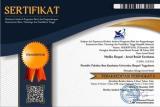PENGGUNAAN ANTIBIOTIK EMPIRIS PADA PASIEN PNEUMONIA
DOI:
https://doi.org/10.35842/mr.v16i4.468Keywords:
antibiotic, empirical antibiotic, pneumoniaAbstract
Empirical Use of Antibiotics in Pneumonia Patients
Background: antibiotic as definitive therapy for pneumonia must be given within 8 hours, but on the other hand, to identify the cause of pneumonia will take several days so antibiotic are often given empirically. This will lead into the inaccuracy of choosing antibiotic for pneumonia patients. Inappropriate use of antibiotic can result in less effective treatment, decreased drug safety, increased resistance, and treatment costs. This analytical study of the use of antibiotics is important in relation to evaluating the use of antibiotic for pneumonia in medical practice. Objectives: : Â this study was to analyze and evaluate the patterns of antibiotic use in pneumonia patients, especially monotherapy and polytherapy antibiotics. Methods: the research location was in Wangaya Hospital, Denpasar City. Data collection was carried out retrospectively based on medical record data of pneumonia patients that hospitalized in 2017-2018. Patients diagnosed as pneumonia with code ICD-10 J.18, aged over 17 years, and receiving antibiotic therapy were included in the study. Results: we found the most widely used antibiotic were the combination of cefoperazone and levofloxacin (24.2%). Conclusion: there is one type of antibiotic combination that has a risk of major interactions that should be avoided.
References
Ahmed, A., Azim, A., Gurjar, M., Baronia, A.K. (2014). Current Concepts in Combination Antibiotic Therapy for Critically Ill Patients. Indian J. Crit. Care Med. 18(5):310-314.
Baharirama, M. V., Artini, I. G. A. (2017). Pola Pemberian Antibiotik untuk Pasien Community Acquired Pneumonia Anak di Instalasi Rawat Inap RSUD Buleleng Tahun 2013. E-Jurnal Medika 6(3): 1-6.
Evayanti, Y. (2016). Rasionalitas Penggunaan Antibiotik pada Pasien Rawat Inap Balita Penderita Pneumonia dengan Pendekatan Metode Gyssens di RSUD Sultan Syarif Mohamed Alkadrie Pontianak [Skripsi]. Pontianak: Universitas Tanjung Pura.
Gupta, D. (2012). Guidelines for diagnosis and management of community-and hospital-acquired pneumonia in adults: Joint ICS/NCCP(I) recommendations. Lung India 29(6): 27-62.
Gyssens, I.C. dan Meer, V.D. (2001). Quality of Antimicrobial Drug Prescription in Hospital, Clinical Microbiology and Infection, Volume 7, Supplement 6, 12-15, Kluwer Academic Publishers, New York.
Islam, Z., Qodariyah, S. M., Nursehah, E. (2017). Penggunaan Antibiotik pada Terapi Community Acquired Pneumonia di RSUD Pasar Rebo dan RSUD Tarakan Jakarta tahun 2014. Jurnal Sains dan Teknologi Farmasi 8(2): 1-8
Jayanti, S.D. (2017). Evaluasi Penggunaan Antibiotik pada Pasien Pneumonia Komuniti Pediatrik di Instalasi Rawat Inap Rumah Sakit Umum Daerah “X†Tahun 2015 [Skripsi]. Surakarta: Universitas Muhammadyah Surakarta.
Kateel, R., Adhikari, P., Rajm, S. (2016). Cost and Antibiotic Utilization of Pneumonia Patients in Intensive Care Unit. Journal of Applied Pharmaceutical Science 6(2): 87-90.
Kemenkes RI. (2011). Pedoman Pelayanan Kefarmasian Untuk Terapi Antibiotik. Jakarta: Kementerian Kesehatan Republik Indonesia.
Khotimah, N. ((2014). Evaluasi Penggunaan Antibiotik pada Terapi Community Acquired Pneumonia di RSUD Budhi Asih Jakarta Periode Januari-Maret 2014 [Skripsi]. Jakarta, UHAMKA.
Minejima, E., Lou, M., Nieberg, P., Wong-Beringer, A. (2014). Patients Presenting to the Hospital with MRSA Pneumonia: Differentiating Characteristics and Outcomes with Empiric Treatment. BMC Infectious Disease 14:252-259.
Ostapchuk, M., Roberts, D.M., Heddy, R. (2004). Community Acquired Pneumonia in Infants and Children, American Family Physician, 70(5):1-10.
Pengurus Besar Ikatan Dokter Indonesia (PB IDI). (2017). Respirasi: Panduan Praktik Klinis Bagi Dokter di Fasilitas Pelayanan Kesehatan Primer. Jakarta: Pengurus Besar Ikatan Dokter Indonesia.
Perhimpunan Dokter Paru Indonesia (PDPI). (2014). Pneumonia Komuniti: Pedoman Diagnosis dan Penatalaksanaannya di Indonesia. Jakarta: Balai Penerbit FKUI.
Permatananda, P. A. N. K., Kristin, E., Endharti, D., Pinzon, R. T., & Sumada, I. K. (2018). Adverse Event of Antiepileptic Drugs: A Cross Sectional Study. Matec Web. Conf. 197 07004.
Permatananda, P. A. N. K., Aryastuti, A. A. S. A., Cahyawati, P. N. (2020). Gerakan Keluarga Sadar Obat pada Kelompok Dharma Wanita Kota Denpasar dengan Metode Belajar Aktif. Jurnal Pengabdian Kepada Masyarakat 6(1): 1-22.
Siepmann, M., Kirch, W. (2001). Drug Points-Tachycardia Associated with Moxifloxacin. Br. Med. J. 322:23.
Suharjono, Yuniati, T., Sumarno, Semedi, S. J. (2009). Studi Penggunaan Antibiotika pada Penderita Rawat Inap Pneumonia (Penelitian di Sub Departemen Anak Rumkital Dr. Ramelan Surabaya). Majalah Ilmu Kefarmasian 4(3) 142-155.




